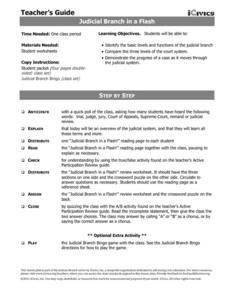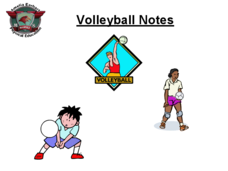Curated OER
Lesson 4: The Judiciary: A Brief Introduction to the Courts System
Focusing on the judicial branch of government, the fourth lesson in this series explores the structure of the US courts system. Beginning with an engaging activity based on the short story The Lady or the Tiger, students go on to examine...
Judicial Learning Center
Levels of the Federal Courts
The Supreme Court gets all the glory, but very few federal cases make it to the highest court. An interesting lesson explores the structure of the lower levels of the federal court system. In addition to outlining the organization of...
School Improvement in Maryland
Court Proceedings Civil Cases
What's the difference between civil and criminal law? How do the court proceedings differ in these two types of trials? How do the standards of proof differ? Why do these differences exist? As part of their examination of the US court...
Curated OER
Science in the Court Room
Share their opinions on the use of DNA databases in criminal investigations. After reading an article, they evaluate the pros and cons of the databases and work in groups to answer discussion questions. They write a letter to a state...
Judicial Learning Center
Types of Court Cases
How can one court acquit someone of a crime, while another convicts the person of the same one? It's all because of the differences between civil and criminal trials. An informative resource provides scholars in the field of criminology...
Judicial Learning Center
Your Day in Court
Whether out of choice or necessity, people want to know what will happen on a typical day in court. A helpful lesson walks scholars in the field of criminology through the trial process from opening statements to the final verdict.
Judicial Learning Center
State Courts vs. Federal Courts
Popular culture often portrays the Feds as the most fearsome of law enforcement agencies. Yet, someone charged with a crime is considerably more likely to end up in a state court. The lesson, one of six covering the Organization of the...
DocsTeach
Court Packing vs. Reorganizing: The Supreme Court in the New Deal
Travel back in time to understand the effects of FDR's New Deal on the Supreme Court. Academics analyze historical documents to understand FDR's attempts to pack the Supreme Court and the opposition he faced. The activity includes a...
Curated OER
Juvenile Court - The Law
An interesting instructional activity on juvenile law, and the juvenile court system. Young law makers are given a lengthy document to read on the basics of juvenile law, then they must answer some questions about what they've read....
Teaching Tolerance
Racial Disparity in the Criminal Justice System
Explore the impact of the war on drugs in a thought-provoking lesson for high school academics. Young historians delve into the world of the criminal justice system and the racial disparity that occurs in the US. The resource provides...
Judicial Learning Center
Your Day in Court: Criminal Justice
When a person goes on trial for a crime, what options does a court have to render justice? Who are the key players in the legal system? Interested legal scholars answer the inquiries and more using an Internet-based activity, chart, and...
Judicial Learning Center
Judicial Independence: What’s Wrong with This Court?
Why is it important for judges to operate independently of politics or other branches of government? Scholars ponder the question as they examine video clips, case studies, excerpts of the US Constitution, and an interactive computer...
Curated OER
Indiana Courts: How Do They Work?
Students identify the branches of Indiana's judicial system and determine the differences between the different courts and different types of cases. Students create a flow chart showing how a court case works its way through the legal...
Judicial Learning Center
Understanding the Types of Cases
Most young scholars are aware of the criminal courts system, but the United States Constitution allows for a much broader role. What other roles do courts play in settling other questions? A case study and WebQuest-style activities...
iCivics
Judicial Branch in a Flash
What is the difference between the federal court and state court systems? What about criminal versus civil cases? Check out this resource that will offer your class members a general and effective overview of the judicial branch in the...
Constitutional Rights Foundation
Criminal Justice in America
The allure of true crime television shows often leads to intrigue of the criminal justice system. Using a six-unit curriculum, learners explore criminology and the justice system in the United States. Topics include the police, trial...
Curated OER
Damilola Taylor: Young people in court
High schoolers read the story, "The scene in the courtroom" then discuss a list of questions. They look at the criminal court system, and design their own user-friendly courtroom.
Judicial Learning Center
The Appeal Process
Why doesn't the Supreme Court hear testimony from witnesses? How do they complete an entire proceeding in less than two hours? A helpful lesson guides scholars of criminology through these and other questions by explaining how appeals...
Curated OER
Black Skin, White Justice: Race Matters in the Criminal Justice System
Students examine the effects of race in the criminal justice system. As a class, they brainstorm a list of instances when the offender has been an African American and he is not treated fairly in court based on his race. They analyze...
Curated OER
The Legacy of the Warren Court
Learners examine the major decisions by the Supreme Court when Warren was the Chief Justice. In groups, they research the life and other works of Earl Warren and discuss how ones background can influence decisions. They also examine...
Curated OER
the International Criminal Court's History And Uses
Young scholars analyze and come to explain the history behind the formation of the International Criminal Court, along with the recent controversy facing the Court; and current crises that warrant the Court's attention.
Teaching Civics
Legal Ways: Extended Jurisdiction Juvenile
An amazing set of resources! Found here are several lessons that work in conjunction to help learners better understand the juvenile court system. Learners review the judicial process, discuss how juveniles are tried, and hold a class...
Curated OER
Volleyball Notes
Pass, set, spike! That's right, volleyball. Teach the basics of volleyball using this presentation. Review court, positions, serving cues, passing cues, and setting cues. Teach the terminology of a volleyball game using this PowerPoint...
Curated OER
What is a Court?
Young scholars examine and discuss the judicial branch of the U.S. government. They define what a court is, list three characteristics of a trial court and an appellate court, and analyze various trial and appeal situations.

























